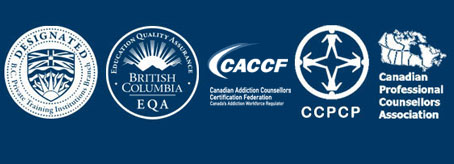Career Planning & Development Parts I & II ELECTIVES

CPD-400 Career Planning & Development
This two part course in a nutshell:
Part I Discussion Topics: The major theories used by career counsellors in the assessment interview and treatment planning. Exposure to the Holland Personality Inventory and other tests used to determine career direction.
Skills: You will learn to conduct assessment interviews which incorporate the major career counselling theories. You will practice evaluating this information by writing a treatment plan for yourself and for a volunteer client.
Part II (Pre-requisite: CPD-I) Discussion Topics: The major theories used by career counsellors in the assessment interview and treatment planning. Exposure to the Holland Personality Inventory and other tests used to determine career direction.
Skills: You will learn to conduct assessment interviews which incorporate the major career counselling theories. You will practice evaluating this information by writing a treatment plan for yourself and for a volunteer client.
Course Objective: Applied Skill Development
On-line delivery of the two-part Career Planning and Development (CPD-400) course introduces basic concepts and professional skills relating to the practice of career counselling.
This course conforms to the ethical guidelines and competency standards as required by the Canadian Professional Counsellors Association, (CPCA) and the Canadian College of Professional Counsellors and Psychotherapists (CCPCP).
COURSE CONTENT:
This two-part course is designed to teach you the major theories and counseling techniques used in the practice of career counseling. Information on how to apply these theories to the development of actual career plans will be presented. Due to the in-depth coverage of the topic and the number of assignments, this course has been divided into two parts:
-- The first course focuses on the major career development theories and techniques which are grouped according to their emphasis in the career counselling process. These theories are helpful in understanding the variables involved in clients’ career-related problem. You will practice appropriate techniques to assess, develop and implement career plans with clinical case studies and a volunteer client.
Topics covered will include:
- Characteristics of an effective career counsellor,
- Ethical guidelines,
- Differences between career counseling and other types of counseling.
- Limits of scope of practice for career counsellors
- Personality Inventories.
- Assessment procedures,
- Career development planning,
- Building trust and the therapeutic relationship,
- Identifying barriers to employment success,
- Overview of the major career development models such as:
-Developmental theories,
-Cognitive theories.
-Matching theories.
-Decision-Making theories.
-Implementation and Adjustment theories.
-Integration of the major theories ,
- Applications of the Treatment Planning Model
PROFESSIONAL PORTFOLIO OF JOB SKILLS
What you will learn:
This practical approach to career counselling is applicable to a wide variety of counselling situations. Your level of proficiency and competence with the skills introduced in this course will deepen as you proceed through a full program of study. Upon graduation from the Diploma or Certificate program, you may include the skills learned in this course in your Profession Portfolio:
- The ability to follow standard guidelines and steps for conducting career-related assessment interviews.
- The ability to apply appropriate counselling techniques for gathering personal and career information,
- The ability to assess for client’s risk factors that may require referral to other professionals.
- Use forms and assessment tools such as the Holland Personality Inventory to gather and organize information during the assessment process.
- Apply appropriate skills for developing a career plan which includes collaborative goal setting to realistically address the client’s career objective.
- Identify and apply the major theories and related techniques to address clients’ career related concerns.
- Determine which approach would be most effective according to individual client’s mandate..
- Apply theories and techniques throughout the entire counselling process: interviewing, goal setting, career planning, and treatment interventions.
- Build a therapeutic alliance, and deal with resistance and barriers to employment.
- Demonstrate cultural sensitivity and ethical decision making.
- Maintain professional boundaries and confidentiality.
- Measure outcome data to judge the efficacy of the career plan.
- Implement the World-of-Work assessment.
In part II of this course , you will have the opportunity to further demonstrate your ability to apply the above information and skills assessing your aptitudes, strengths, and personality traits relating to career choice; by developing your own career plan and resume.






